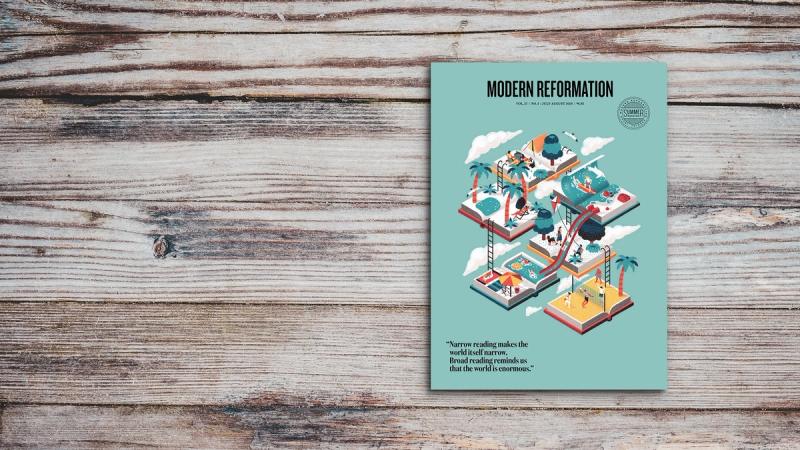Crossing the Drake Passage from Argentina to Antarctica challenged our sense of balance. In a small icebreaker made for calmer seas, our family hunkered down, sliding from one side of the boat to the other. Eventually, after an experienced sailor took pity on us and taught us how to stand, we ventured out into the cold, clear sunshine on deck. Soon, we joined the chorus of our colleagues, all exclaiming in wonder over this frozen, dazzlingly beautiful world all around us.
Even though we are united to Christ, we can feel that same disorienting lack of balance in our current historical moment. We hunger for equilibrium. We hesitate to venture out into a world where power attempts to overcome the good, lies labor to suppress truth, and ugliness tries to engulf the beautiful. We often feel unsteady and discouraged. We forget those things the Father uses to remind us that what he created is both good and beautiful.
Poetry done well declares witness to such beauty. Poets spend hours looking for a combination of words that is true to how they see this created world. “Tell all the truth but tell it slant,” Emily Dickinson instructs us.1
When the poet takes our hand and leads us to these slanted places, we often are overcome with emotion. We weep because we know, deep in our hearts, that there is so much more to life than what we can measure, manipulate, or control. When we let a proper poet lead us, we climb new heights to view new vistas. Panoramas and perspectives unwind themselves and the multidimensional written word startles us. In our world, often hypnotized by deceit and cunning, we need these tangible touches to shake us from our slumber. Rousted awake by the thrum of life-filled lyrics, we feel curiously refreshed. Restored, we run toward the poet’s painted sunsets that dance and frolic and bid us join in the joy.
King David was a poet, and Solomon as well. Closer to our day, we find poets such as George Herbert and Francis Thompson,2 who understood both the poetic line and the wonder of the gospel revealed in Jesus Christ. They welded together art and truth with word-sculpture proclamations that make us shiver with delight. This feast of crafted words provides a foretaste of the new creation to come.
Poetry helps restore our balance. It gives us hope when focusing on God’s beauty that still thrives amid these fallen ruins. Because God’s image resides in us, albeit disfigured by sin, God’s creation still speaks to us. Words wrought well remind us that we have a loving Father who still is the Gardener over all we survey.
At the same time, poetry can contribute to our destruction. Like sharp knives wielded by one who seeks only to destroy, words can cut deep when they advance the materialism and despair that characterize much of our postmodern assumptions. The enlightened poet, by contrast, strives to locate and unfold and reveal beauty while acknowledging the reality of our fractured world. As Leonard Cohen wrote, “There is a crack, a crack in everything. That’s how the light gets in.”3 While the enemy would crush us with despair, the Holy Spirit continues to reveal and testify to us that God’s creation is always good. The light of the good creation seeps, even leaps, out of poems properly forged in our land of exile.
When I was studying for my Master of Fine Arts in poetry, I attended a workshop where New York Times best-selling novelist Janet Fitch encouraged us to start each day by reading poetry out loud for ten minutes. Poets, she said, hold the standard of the language while pushing hard to find meaning in their lives. Novelists take life slowly. Poets, by contrast, are on the edge of experience at all times. Poets are first lifers—this is their first time here, and they are enraptured with everything. They run at life with arms open. Let us therefore read the poets! Our loving Father adores us, and he longs to give good gifts to his children. Poetry is one of those gifts, waiting to be discovered by sons and daughters of the living God.
Mark Green is an ordained minister in the Orthodox Presbyterian Church and president of White Horse Inn.
- Emily Dickinson, “Tell all the truth but tell it slant,” The Poems of Emily Dickinson: Reading Edition (Cambridge, MA: The Belknap Press of Harvard University Press, 1998).
- See The Hound of Heaven by Francis Thompson (1893).
- Leonard Cohen, “Anthem,” The Future, Columbia Records, 1992.
RECOMMENDED READING
The Ode Less Travelled by Stephen Fry (2005)
An excellent introduction to poetry in the classic mode. Witty and down to earth. Examples and not an anthology.
99 Poems: New and Selected by Dana Gioia (2017)
Written in plain English with both sad and funny moments, with his serious Catholicism occasionally peeking through.
An Introduction to Poetry (13th ed.) by X. J. Kennedy and Dana Gioia (2009)
Dana Gioia recommended this book to me when I asked him where to start. It’s expensive but luxurious.
Twentieth-Century American Poetry edited by Dana Gioia, David Mason, and Meg Schoerke (2003)
This anthology places the poems in their context with helpful background on the poets. Unfortunately, Wendell Berry’s work is missing but this collection is still delicious.




